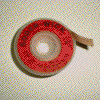|
|
BEAM Techniques is a BEAM Reference Library site.
Tools and supplies
What you'll need, what you'll just
want
Probably one of the first questions a "BEAM newbie" asks is this -- "what tools and such do I need to have?" Well, you'll get different answers from different folks, but here's my take on things:
Tools and supplies you must have
Needle-nosed pliersWire cutters
Electrical (vs. jewelry or plumbing) flux-core solder; solder with water-soluble flux is preferable
Electronics soldering iron (~30 W, with "pencil" tip)
Desoldering wick
, and / or a "solder sucker"
Analog multimeter (to measure voltage, current, resistance)
A breadboard for testing circuits
Small-gauge electrical wire (the kind used for telephone extensions works great!)
Heat-shrink tubing of various (small) sizes
Epoxy glue (I use the fast setting kind)
Tools you'd like to have (but can wait for)
Upgraded multimeter (digital, with the ability to measure capacitance). Look for these on sale, it's helpful to pick up a couple over time as your budget allows.Upgraded soldering iron; one with electronic temperature control.
"Plasti-dip", in a can (the only spray-can "color" of Plasti-dip I use is the clear kind, otherwise I use black or red Plasti-dip in a can). The smaller size can comes with a brush in the metal lid -- very handy.
An oscillosope -- look at yard sales or on eBay, an old-but-working one is fine for our uses. A functional (if not fancy) single-trace oscilloscope can occasionally be had for as little as $25 (US). Meanwhile, Tektronix has an Oscilloscope tutorial here, and Trinity College (Dublin) has one here. If you have an old, little-used PC or Mac available, free software is available to turn it into a digital oscilloscope as well:
Mac
PC
Note, though, that this approach has severe limitations -- in particular, computer sound cards use capacitors in the input signal path, so low frequency inputs are filtered out (the low frequency limit is hardware-dependent) and any DC level is removed.
One of those little aligator-clip-on-an-arm gizmos (with the magnifying glass)
Water-soluble solder paste, tweezers, fine-width desoldering wick, and fine-width silver-bearing solder if you're going to work with surface mount components
|
|
||
|
|
This page was last updated on |
|
